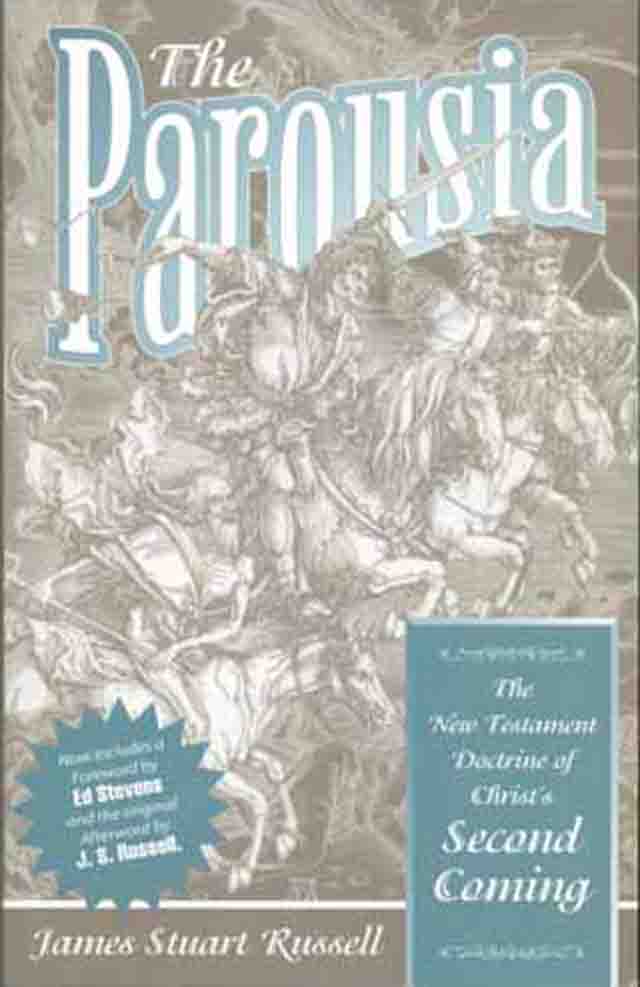Product Details Page
information, details and purchase

James Stuart Russell
The Parousia
First published anonymously in 1878, Russell's book has become a classic within preterism. Scroll down for more details.
``````````
(FCG does not necessarily endorse the views expressed in this book.
For more see
Reader Beware.)
The Parousia: The New Testament's Doctrine of Christ's Second Coming
James Stuart Russell (1816-1895)
How would you rate this book?
Description
The term ‘Parousia’ is derived from a Greek word meaning simply, ‘a coming’ or ‘a presence’. In the context of the Bible and Christianity, it refers to the return of Jesus Christ as a core prophecy of the New Testament scripture. It is by investigating all of this material that James Russell seeks to make clear what exactly the Bible predicts and what specifically believers may expect in the future, and what aspects of the prophecy have already occurred in the distant past.
Exhaustively researched and painstakingly compiled, Russell’s thesis is lengthy and split into three parts: firstly, he analyses the four Gospels of Christ, secondly, he examines the Acts of the Apostles, and lastly, he looks at the Book of Revelation and the visions therein. No detail is spared from the author’s learned gaze, with aspects of the Bible lore clarified and explained. For his part, Russell believed that most aspects of the Bible prophecy have already been fulfilled in history – only certain passages of Revelation have not yet corresponded to real world events. Quoting and narrating the Biblical passages at length, Russell efforts to clarify are not in vain – at the time this work was first published in the 1870s, then edited and republished in the 1880s, the reaction was one of praise. Christians, for whom the Bible’s words and ideas had hitherto been a mystery, at last had a book to consult whose wisdom was soundly supported by the very words of the Holy Bible.Author
Early life and ministry James Stuart Russell, the son of a pious Scotsman, was born at Elgin, Morayshire, on 28 November 1816. He entered King's College, University of Aberdeen, at the age of twelve and when eighteen he completed his M.A. degree. His religious decision dates from about his sixteenth year under the influence of his older brother. For a time he served in a law office. Then to prepare for a Christian ministry he studied in the Theological Halls of Edinburgh and Glasgow, ultimately finding his way to Cheshunt College.
In June 1843 Russell became an assistant minister at the Congregationalist Church in Great Yarmouth before taking over as minister. In 1857 Russell transferred to the Congregational Church in Tottenham and Edmonton. While holding this position, Russell visited Belfast to observe the working of the great Irish Revival and came under its influence. On his return a similar awakening occurred in his own church. After a stay of five years in his second church, Russell was attracted to a new church in the rapidly growing Bayswater, whose chapel in Lancaster Road was built in 1866. Here he continued to serve until his years and failing health led to retirement near the end of 1888. Russell was not only an able preacher, but also a man of kindly deportment. He was gifted with winning personal characteristics, which secured for him a devoted following. His pleasant manners and genial spirit, his native humor and genuine wit, his extensive reading and wide knowledge and most retentive memory, made conversations with him agreeable and profitable. Russell's fervor stretched beyond the limits of his own pastorate. He was present, in 1843, at the formation of the Evangelical Alliance, with whose aim and operations he remained in warm and active sympathy to the last. He had an ever-deepening sense of the importance of the temperance movement, and he was the first chairman of the Congregational Total Abstinence Association. Both the National Temperance League and the United Kingdom Alliance counted him among their members. His advocacy of the good cause was in frequent demand for meetings in London and the suburbs. Publishing The ParousiaRussell had held the doctrine of the past second Advent (Preterism) for many years before writing or even speaking on the subject. He used to describe how the matter came to him as a sort of revelation. On discovering the key to the mystery, the whole theme gradually unfolded. It was to him a source of constant delight to see one point after another fall into harmony with what he believed to be the central truth. Accordingly, in 1878, he published anonymously his now celebrated, The Parousia, containing an elaborate exegesis on these lines of New Testament teaching concerning the second coming of Jesus Christ. Another edition followed with the author's name attached. This work drew much attention to the subject on both sides of the Atlantic. The University of Aberdeen soon signalled its appreciation of the book by conferring on the author a diploma in divinity, which he valued all the more highly because it came from his alma mater. Later life
Russell's later years clouded with bodily infirmity and painful disease. He bore his sufferings, to the admiration of attendants and medical advisers, with a manly and even cheerful patience, upheld by his Christian faith. Again and again he repeated the words, "On Christ the solid rock I stand!" Moreover, his physical trials were happily relieved, as those of his sainted wife had been, by the tender solicitude and untiring devotion of an only daughter. From her arms and those of her one brother, the father passed peacefully away on 5 October 1895, in the 79th year of his age and the fifty-second year of his ministry. Russell is buried in the Kensal Green Cemetery.
Reviews
(To submit a review, scroll down to the form below.)
Your honest review will help others in their search for truth. If you must leave a negative review please be gracious.
Rather, speaking the truth in love, we are to grow up in every
way into him who the head, into Christ . . . .
(Ephesians 4:15)
[Note: The review text fields may not word wrap on smaller-screened devices, so when viewing on tablets and phones you may need to slide the text field with your finger to read the entire post. Viewing on a phone is best done in "landscape."]
Submit a Review
Thank you for sharing your insights with the community!
Iron sharpens iron, and one man sharpens another. (Proverbs 27:17 ESV)
 Fulfilled
Fulfilled